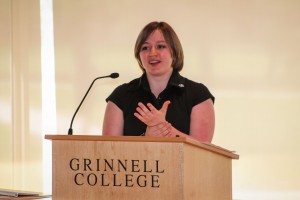By Darwin Manning
manningd@grinnell.edu
On Monday and Tuesday, April 29-30, Grinnell held its second Annual Humanities Student Symposium, which covered a wide range of topics. The event invites students from the many disciplines in the Humanities to showcase scholarly work completed during the 2012 calendar year.
Shuchi Kapila, Department of English, was one of the primary organizers of the event. She considered last year’s Symposium to be a resounding success and attempted to incorporate some of its best elements into this year’s event: they continued the tradition of soliciting papers and having authors do a workshop with Acting Director of the Writing Lab Janet Carl. This year the symposium had several themed sessions: “Gender, Politics, Identity,” “Gender and Authority,” “Art as Politics: Collaboration and Commemoration” and “Representing Divinity and Power,” as well as a keynote speech delivered by Christopher Newfield.

“Our model last year was good, so we hope to keep to that structure,” Kapila said. “I might look for other avenues to advertise for this at [the] beginning of the semester.”
One unintended change Kapila noted was a decrease in the variety of applications. In future years, she hopes to encourage a diverse assortment of applicants with unique presentations, as well as expand the event to other places on campus.
“We would like to see more specific departmental proposals. Last year we had many more from Music and Arts,” Kapila said. “Maybe we could vary the panel to get a variety of presentations and maybe vary the locations—for instance, we could have some of these in Bucksbaum or some in the amphitheater.”
One of the presentations that did cater to this demand for stylistic variation was an original one-act play written and directed by Anna Banker ’15. Her piece, I Dream Before I Take the Stand, was the final project for her Theatre and Dance 235 Directing class. Though it had already premiered in a festival held last semester, Banker believed that the symposium would give her project greater depth.
“We decided to have this performed at the Humanities Symposium to have it critically discussed, to think about creative means of using theater as a vehicle for civic reflection,” Banker said.
Assessing the Symposium, Banker believes that it reveals the breadth of the Humanities and she views this as a vehicle for bringing together a diverse range of interests. Additionally, she hopes that more people will be able to participate in this process of having a wider audience critically reflect on your work in the future.
“I hope that more people attend and that it just becomes a bigger event every year, I think this one was bigger than [the] last and I hope it can continue to grow,” Banker said.
Another student who presented her work at the symposium was Eunice Ahenkorah ’13. Ahenkorah discussed her term paper about the Muslim experience in France for a class on Middle Eastern politics. She had initially thought that presenting in front of professors would be a daunting task; yet, once she went through the motions of working with the Writing Lab, she felt comfortable in the role.
“You take a much more adult role when you are up at the podium and you get a large boost of confidence because you are doing something for yourself and not just a class,” Ahenkorah said.
The Symposium also gives students the opportunity to assume a larger sense of ownership over their work and Ahenkorah would encourage more students to get involved.
“The Symposium helps students delve more into a subject by picking up a term paper that they may have put down,” Ahenkorah said. “Taking the chance to go back allows one to rethink the subject and have a sense of ownership for the project.”
Another highlight was the keynote speech from Christopher Newfield, Professor of English at UC Santa Barbara. His talk, titled “The Return of Creativity: Literacy Theory v. Innovation Theory,” asserted the need to refocus our attention in higher education on the Humanities.
Reflecting on the event, Kapila believes that she gained substantially from listening to students’ work and having them present in front of professors.
“It was rewarding to see how sophisticated our students are when reading the essays and I like the formality of what they wrote, because that is something that we don’t often see,” Kapila said. “Students are the ones up there and we are in the audience; that reversal is very satisfying.”



















































